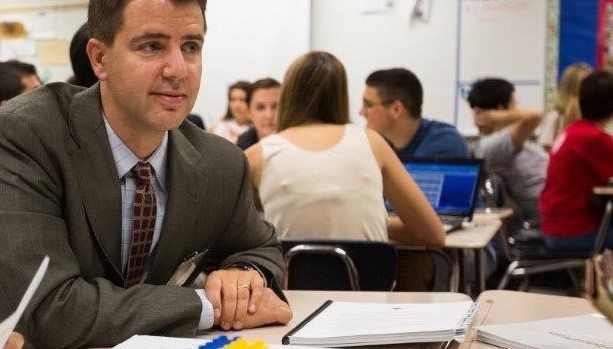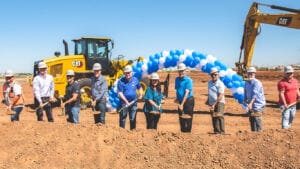Jim Belfiore, CEO and President of Belfiore Real Estate Consulting, has spent nearly a decade volunteering to help high school students enrolled in economics classes understand the nuances of urban planning and development. In schools where UrbanPlan has been offered, enrollment in the class has “skyrocketed,” he says.
Of ULI’s 52 district councils, 15 have UrbanPlan programs. With the exception of a few councils with higher education partnerships, UrbanPlan is exclusively offered in high school curricula. Schools that offer the UrbanPlan program in their economics classes are Desert Vista and, most recently, Brophy Prep.
To put the impact into perspective, Desert Vista High School instructor Shannon Corcoran teaches the UrbanPlan curriculum to 250 students every semester. During the program, students work with classmates to create a redevelopment plan in response to an RFP and receive live feedback from a mock city council comprised of industry experts, such as Brett Heron, executive vice president of finance at RED Development. Heron is a seven-year volunteer.
“Growing up, none of my friends or family were in real estate, so I didn’t have much exposure to it,” he says. “I became interested when I took a class in college.”
He says a program like UrbanPlan would have given him a better idea of different real estate disciplines and may have allowed him to focus more deeply on those areas during college.
“We continually receive feedback from the hundreds of Arizona students who have taken the program,” says Belfiore. “UrbanPlan changes their perception of the community they live in, increases their confidence, gets them involved in real estate and their communities, and many have told us the program was ‘the’ single-most valuable experience they have had in their years within the educational system.” ULI selects schools that have reputations for being high performing, says Jeff Mongan, senior vice president of The Athens Group, who has been with the program since it started and currently chairs the UrbanPlan Committee.
“This interaction provides the future leaders of our community an opportunity to gain a better understanding that high quality sustainable economic development and the built environment don’t happen by accident,” says Mongan. “Instead, it requires a team working together, collaborating with the local community to achieve a win-win result and enhance the community they live in.”
Last year, Mongan received a letter from a college graduate who had participated in UrbanPlan six years earlier.
“He mentioned that participating in UrbanPlan … had a transformational effect on his thinking about his future and that it was foundational in terms of preparing him for the challenges of college and his ultimate career choice. That was special,” he says.
Shannon Corcoran, an economics instructor at Desert Vista High School, gets to hear about the program’s effect first-hand. She has seen students take what they learn in her class to careers in economics, marketing and business. Some have gone on to become city planners, involved in real estate, sales and design, she adds.
“I always tell my students UrbanPlan is the best practice for an interview they will ever have,” she says, adding, “Whether or not they end up in the field as a land use professional, they still have a greater understanding and willingness to participate in decisions within their own communities that impact land use decisions around them.”
Like Belfiore, Corcoran also gets goosebumps talking about UrbanPlan.
“One [moment] in particular was when I had a student who had no real plan for the future say to me … I love this and I want to do this for my job,” she says. “That student is now at ASU getting a master’s in real estate development.”




